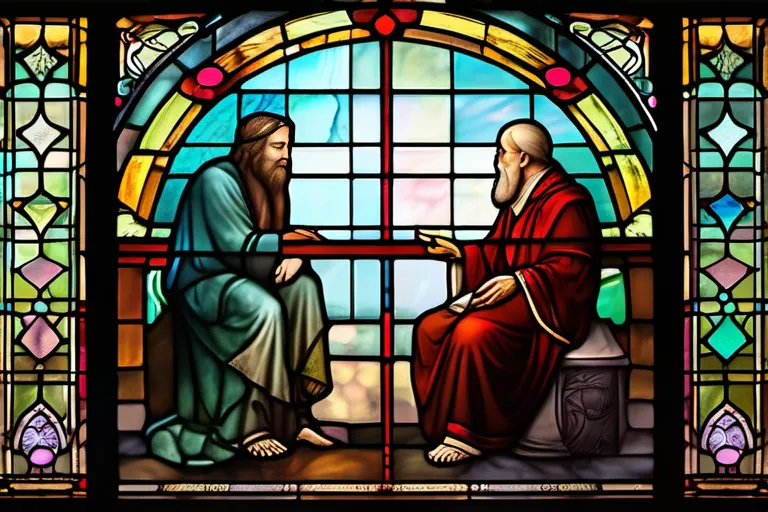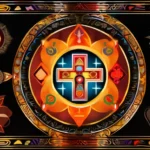Explore the profound relationship between religion and philosophy, their shared roots, and their ongoing influence on human thought.
In this article, we delve into the fascinating connection between religion and philosophy. From their shared origins to their ongoing impact on human thought, we’ll explore how these two disciplines have shaped our understanding of the world and ourselves.
The Origins of Religion and Philosophy
Imagine stepping back in time to the cradles of human civilization, where religion and philosophy first intertwined like threads in a rich tapestry. In ancient Mesopotamia and Egypt, for instance, we find that the lines between divine worship and intellectual inquiry were blurred, much like the boundaries between day and night at dawn.
Consider how these early civilizations saw gods as architects of their world. This belief system often led to philosophical questions about existence, purpose, and morality. The priests who presided over religious ceremonies also served as scholars, scribes, and thinkers, blending spiritual wisdom with intellectual curiosity.
In the context of this ancient interplay, how could one truly distinguish between a philosopher seeking answers through reason and a priest guiding followers towards divine truths? They seemed to be facets of the same human quest for understanding. This connection is evident in texts like the Epic of Gilgamesh, where philosophical themes of mortality and wisdom are intertwined with religious narratives.
Moreover, the idea of a cosmic order or a universe with inherent meaning was explored both within religious doctrines and philosophical speculations. These early thinkers pondered not just what the gods wanted but why they existed in the first place—a profound query that echoes through millennia into modern philosophy.
As we trace these origins, it becomes clear that religion and philosophy are not merely separate disciplines but deeply intertwined aspects of human endeavor. In this intricate connection lies a fundamental truth: our quest for understanding is as much spiritual as intellectual, a journey that has shaped the course of human history from its very beginnings.
How do you see these early roots influencing your own search for meaning and purpose today?
The Shared Roots of Religion and Philosophy
The shared roots of religion and philosophy are like two branches of the same tree, intertwined and deeply connected. Both seek to unravel the mysteries of existence, but through different lenses. While religion often provides a framework for believers to find comfort and guidance in their daily lives, philosophy delves deeper into abstract questions about the nature of reality, knowledge, and ethics. How do these two disciplines, seemingly so distinct, actually complement each other?
Consider the search for meaning. In many religious traditions, meaning is derived from divine revelations or sacred texts, providing clear guidance on how to live one’s life. However, philosophy takes this a step further by questioning the very foundations of these beliefs. It asks, ‘What does it mean to have faith in something we cannot see?’ Philosophers like Socrates and Plato grappled with these questions long before any religious texts were written, laying down the groundwork for later thinkers.
Another shared theme is purpose. Religions often provide a sense of purpose through belief in an afterlife or a higher power. Philosophical inquiry also explores what gives life meaning, whether it be through personal growth, intellectual pursuits, or contributing to society. Think about the famous question posed by Immanuel Kant: ‘What is the supreme good?’ This question echoes religious teachings but approaches them from a different angle.
The pursuit of wisdom and understanding is another common thread. Both religion and philosophy seek knowledge, though they may differ in their methods. For example, gnosis, or spiritual insight, plays a significant role in certain religious traditions, while philosophers like Aristotle emphasized empirical observation and logical reasoning. The interplay between these two approaches enriches our understanding of the world around us.
In essence, the relationship between religion and philosophy is not one of opposition but of mutual support. They both contribute to the broader quest for human knowledge and wisdom, each offering unique perspectives on life’s profound questions. As we delve deeper into their shared roots, it becomes clear that they are inseparable parts of a larger tapestry of human thought and experience.
The Development of Religious Systems
The development of religious systems has been a fascinating journey, much like tracing the branches of a vast and complex tree. How did these major world religions—such as Christianity, Islam, Hinduism, Buddhism, Judaism, and others—evolve over time? What are their unique beliefs, practices, and cultural influences that have shaped human thought?
Let’s start with Hinduism, the oldest of the major world religions. Its origins can be traced back to the Indus Valley civilization around 1500 BCE. Hinduism is not just a religion but a way of life, with its roots deeply embedded in the ancient texts such as the Vedas and Upanishads. The belief in reincarnation and the concept of Dharma, or duty, are central to Hindu practice.
Moving to the West, we find Judaism, which emerged around 1800 BCE. It is a monotheistic religion with a strong emphasis on covenant and law. The Torah serves as its primary text, and the practices of Judaism have influenced not only religious but also philosophical thought, particularly in ethics and morality.
Christianity, born out of Judaism around 1 CE, has had an immense impact on Western culture. Its beliefs about Jesus Christ, resurrection, and salvation have profoundly shaped moral and social norms. The Bible is central to Christian doctrine, and its teachings continue to influence philosophical debates on justice, freedom, and human rights.
Islam, founded by Muhammad in the 7th century CE, has a strong emphasis on the oneness of God and the importance of submission (Islam). Its rich cultural contributions have also included advancements in science, medicine, and architecture, reflecting its deep philosophical inquiries into existence and the universe.
Buddhism, founded by Siddhartha Gautama around 500 BCE, focuses on achieving enlightenment through the Four Noble Truths and the Eightfold Path. Its teachings have spread across Asia, influencing not only religious but also political and social structures. Buddhism’s emphasis on non-violence and mindfulness continues to resonate in contemporary philosophical discussions.
Each of these religions has contributed uniquely to human understanding and ethical frameworks. They offer different perspectives on life’s meaning, moral values, and the nature of existence, much like different leaves on a tree each capturing light in their own unique way. As we delve deeper into their development, we see that religion and philosophy are not merely parallel paths but intertwined ones, reflecting the complexity and depth of human experience.
The Development of Philosophical Thought
The Development of Philosophical Thought: A Journey Through Time
Imagine philosophy as a vast, ancient forest, where every tree represents a unique school of thought and each leaf is a concept. From its roots in ancient Greece to the towering branches of modern-day schools of thought, this forest has seen countless ideas grow and flourish. But how did it all begin?
From Ancient Greece to Modern Times
In the cradle of Western civilization, philosophy was born not just as a discipline but as a way of life. Socrates, Plato, and Aristotle laid down the foundational stones that still resonate today. Their questions—“What is knowledge?” “How should one live?”—are like ripples in a pond, spreading out to touch every corner of human thought.
Fast forward through centuries, and philosophy becomes a mosaic of colors, each tile representing a different movement or philosopher. The Enlightenment with its emphasis on reason and science, the Existentialists questioning individual freedom, and the Analytic Philosophers delving into logical structures—each adds a layer to this rich tapestry.
How do these ideas influence our daily lives?
Consider the impact of philosophical thought in contemporary society. From ethical debates on artificial intelligence to existential questions about purpose, philosophy continues to shape our worldviews and guide our actions. It’s not just about academic discourse; it’s about understanding ourselves and our place in this complex universe.
In essence, the development of philosophical thought is a continuous exploration of human existence, a quest for meaning that has evolved over millennia but remains as relevant today as ever. As we navigate through life, philosophy provides us with tools to question, understand, and perhaps find answers to some of our most profound inquiries.
The Intersection of Religion and Philosophy
How do we make sense of the world around us, beyond the purely logical and empirical? Enter religion and philosophy—two profound forces that have intertwined throughout human history like the roots of a vast oak tree.
Philosophy, often described as the love of wisdom, seeks to understand fundamental questions about existence, knowledge, ethics, and reality. Religion, on the other hand, provides answers through divine revelations or spiritual experiences. But why do these two seemingly distinct paths converge so frequently?
Consider ancient Greece, where philosophy flourished alongside religious beliefs. Socrates, Plato, and Aristotle all engaged with questions of justice, virtue, and the nature of the universe, often drawing on myths and deities to support their arguments. Were they philosophers or priests? The distinction is blurred.
In India, the concept of dharma (duty or righteousness) bridges philosophy and religion. Hindu texts like the Bhagavad Gita explore ethical dilemmas through divine guidance, providing a framework for moral reasoning that also delves into metaphysical questions. Is dharma more about spiritual practice or philosophical contemplation?
Moving to medieval Europe, we find thinkers like Thomas Aquinas who sought to reconcile Christian theology with Aristotelian philosophy. His work, Summa Theologica, is a testament to the seamless integration of faith and reason, showing how religious principles can be logically argued for. Did he succeed in creating a harmonious blend, or did his efforts merely highlight the inherent tension between the two?
The intersection of religion and philosophy continues into modern times. Thinkers like Immanuel Kant integrate moral philosophy with Christian ethics, while philosophers such as Jean-Paul Sartre explore existentialism through a secular lens. How do these contemporary perspectives reshape our understanding of human existence?
The Ongoing Influence of Religion and Philosophy
The ongoing influence of religion and philosophy on contemporary society is like a river that flows through the landscape of our daily lives, shaping how we think, act, and perceive the world around us. How many times have you considered the role of ethics in politics or pondered the moral implications of your actions? These questions often echo the deep discussions found within religious texts and philosophical works.
Consider the democracy we enjoy today; it is deeply rooted in ancient Greek philosophy, where thinkers like Socrates and Plato explored ideas about justice and governance. Their concepts have influenced not only political systems but also our personal beliefs on what constitutes a fair society. Can you imagine a world without the principles of freedom and equality that these philosophers championed?
Religion too has played a pivotal role in shaping culture, from the visual arts to literature and music. Think about the countless churches, mosques, synagogues, and temples that stand as testaments to religious devotion and cultural identity. Each one reflects not only spiritual beliefs but also artistic expression and societal values.
Moreover, religion and philosophy continue to be intertwined in our ethical discussions, particularly when it comes to issues like human rights and environmental stewardship. How we treat each other and the planet is often informed by religious teachings and philosophical theories about the interconnectedness of all life. Are we truly living up to these ideals, or are we merely paying lip service?
As we navigate the complexities of modern society, it’s clear that the insights from both religion and philosophy remain as relevant today as they were centuries ago. They continue to offer us a lens through which to understand ourselves and our place in the world. Do you think these ancient wisdoms can help guide us towards a more just and compassionate future?
Conclusion
 By examining the relationship between religion and philosophy, we gain a deeper appreciation for the complexities of human belief systems and the ways in which they continue to evolve over time.
By examining the relationship between religion and philosophy, we gain a deeper appreciation for the complexities of human belief systems and the ways in which they continue to evolve over time.











